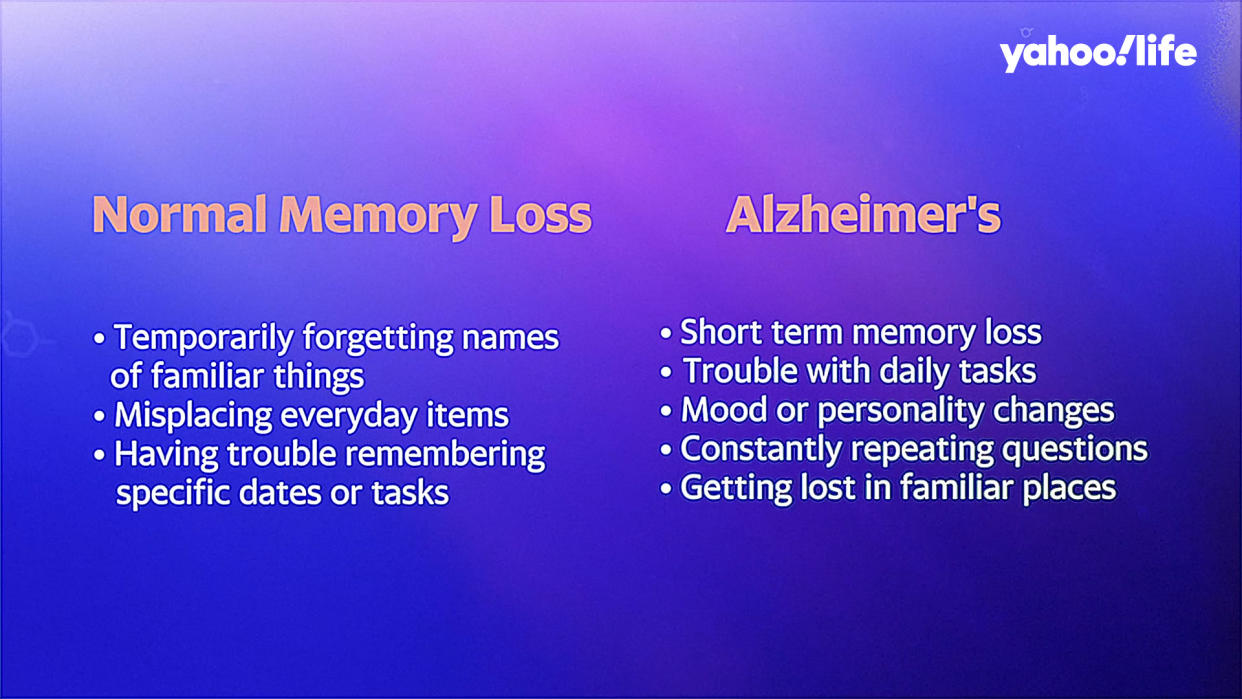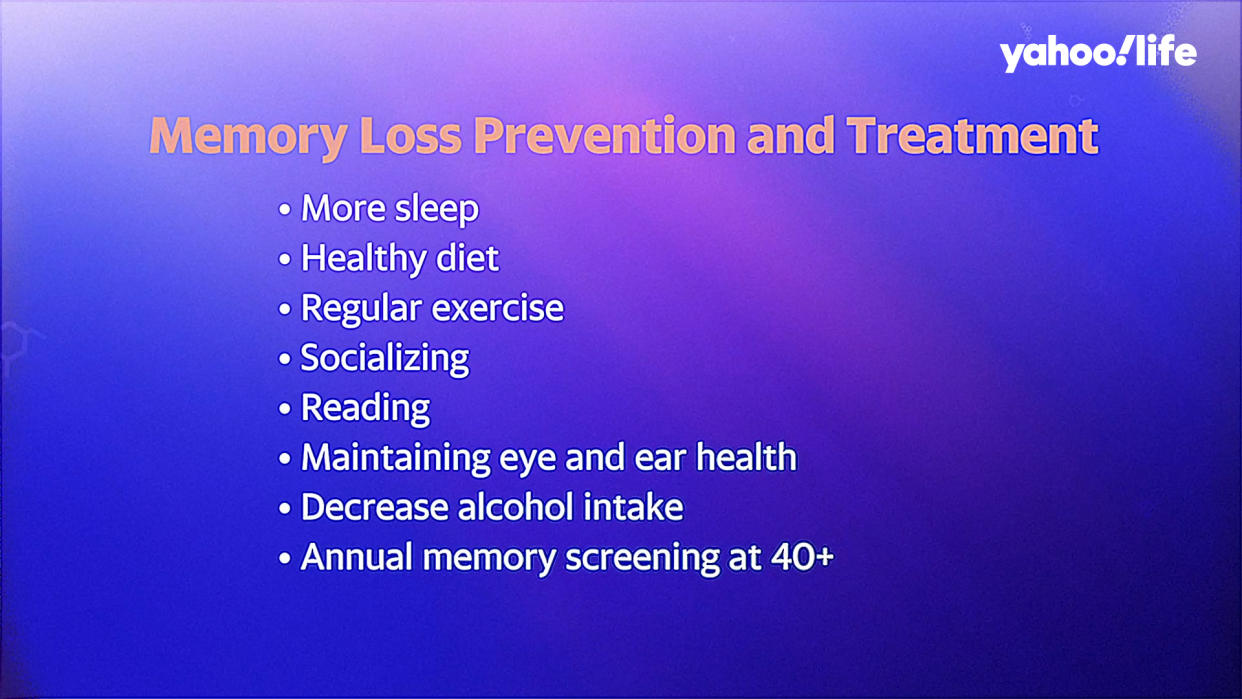Alzheimer's vs. normal memory loss: here are 5 things to know right now
An estimated 6.5 million Americans age 65 and up are living with Alzheimer's disease. The progressive disease is devastating and can cause symptoms ranging from memory loss to seizures, according to the National Institute on Aging (NIA).
With that, it's understandable to be nervous if you find you or a loved one has been forgetful lately. But there is a difference between being forgetful and having Alzheimer's disease — and misplacing your keys here and there isn't a reason to panic, Dr. Gayari Devi, director of Park Avenue Neurology and attending physician at Lenox Hill Hospital in New York City, tells Yahoo Life. Still, it's important to at least be aware of the symptoms of Alzheimer's disease. Here's what you need to know.

1. Alzheimer's disease: know the symptoms
Alzheimer's disease "is an illness of the brain that occurs primarily in older people where brain cells start to die," Devi says. There are a "multitude of factors" that can lead to this, including plaques and tangles in the brain, "which are protein deposits that we think cause harm to the brain cells," Devi explains. Head injuries and hormones may also play a role, she says.

When a person has Alzheimer's disease, "the brain cells and the brain networks start to die [and] there is dysfunction in terms of the person's ability to cognitively process things," Devi says. As a result, she says, "they may have trouble with their memory, they may have trouble with their language, they may have trouble calculating. So depending on the cause, any number of things could go wrong."
Symptoms of Alzheimer's disease can vary depending on the stage, per the NIA. Those include:
Mild Alzheimer's disease:
Memory loss
Poor judgment leading to bad decisions
Loss of spontaneity and sense of initiative
Taking longer to complete normal daily tasks
Repeating questions
Trouble handling money and paying bills
Wandering and getting lost
Losing things or misplacing them in odd places
Mood and personality changes
Increased anxiety and/or aggression
Moderate Alzheimer's disease:
Increased memory loss and confusion
Inability to learn new things
Difficulty with language and problems with reading, writing, and working with numbers
Difficulty organizing thoughts and thinking logically
Shortened attention span
Problems coping with new situations
Difficulty carrying out multi-step tasks, such as getting dressed
Problems recognizing family and friends
Hallucinations, delusions, and paranoia
Impulsive behavior such as undressing at inappropriate times or places or using vulgar language
Inappropriate outbursts of anger
Restlessness, agitation, anxiety, fearfulness, wandering—especially in the late afternoon or evening
Repetitive statements or movement, occasional muscle twitches
Severe Alzheimer's disease:
Inability to communicate
Weight loss
Seizures
Skin infections
Difficulty swallowing
Groaning, moaning, or grunting
Increased sleeping
Loss of bowel and bladder control

2. Some level of forgetfulness is normal
Forgetting is actually an important part of life, Dr. Devi says. "Forgetting allows our brain to prune itself and to be able to adapt to the new environment," she explains. "So as a child, we learn to forget to crawl in order to be able to walk. We learn to forget old traumas in order to be able to fall in love again. We learn to be able to forget childbirth, the pain of childbirth so that we can be pregnant again if we're women."
Devi says it's can be "tough" sometimes to tell the difference between normal forgetfulness and early signs of Alzheimer's. "If the forgetting interferes with your functioning, if the forgetting doesn't get better, if it seems like it's getting worse, then it's time to seek help," she says.
3. Alzheimer's vs. dementia
The two are used interchangeably but they're not the same. "Dementia is the umbrella term," Devi says. "So any disease where there's progressive loss of cognitive function related to the depth of nerve cells is called dementia. Alzheimer's is a type of dementia."
4. Lifestyle factors can lower your risk of Alzheimer's
Devi says she often hears people concerned about their own health if they had a parent or grandparent with Alzheimer's. "Between 40% and 60% of cases of dementia are preventable and preventable through simple, boring things like sleeping well and eating well," she says. Exercising regularly, socializing, stimulating your brain, and reading can also help, she says.
"I find that my patients who are worried about getting Alzheimer's because of a family history, they actually are living healthier lives because they want to prevent it and they end up having a lower risk than some of my patients who have no family history," Devi says.

5. Early diagnosis is important
Catching an Alzheimer's diagnosis early is "extremely important for treatment because the earlier you diagnose a person, the quicker you are able to help slow factors that can contribute to progressive decline," Dr. Devi says. Memory screenings are covered by Medicare and many other health plans, and should be part of your annual checkup.
Factors that can help slow decline may include:
getting better control of blood pressure
controlling diabetes, if someone has it
controlling cholesterol
reducing drinking
increasing physical activity
"All those things will significantly improve their quality of life and help to prevent progression as rapidly as we didn't do those things," Dr. Devi says. "It translates into a few more years of functional life."
Dr. Devi says that there are medications that can help as well. "There's a sense of 'What's a point in the diagnosis? There's nothing to do anyway.' That is completely untrue," she says.
If you've been diagnosed with Alzheimer's disease, Dr. Devi recommends that you "trust your brain, embrace your brain and help your brain fight this illness." She adds, "don't give up, don't listen to what anyone else has to say. It's your brain and you can help it go through this and help it to prevent decline as best as possible."
And, if you're a caregiver for someone with Alzheimer's disease, Dr. Devi recommends that you do your best to include them in your activities and "treat them like they're regular people." She adds, "Don't treat them like they're in a glass container, but also don't point out when they forget things because that doesn't help anybody."


